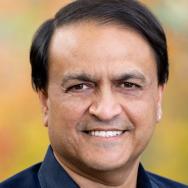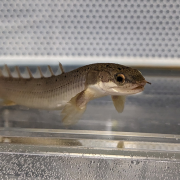Editor’s note: This story is part of Dispatches from Abroad, a series highlighting UChicago community members who are researching, studying and working around the world.
Every other January, early-career scientists from across Latin America gather at a former whaling station in the coastal Chilean village of Quintay.
They’re flocking for an intensive course in Developmental Biology based on programming at the University of Chicago-affiliated Marine Biological Laboratory in Woods Hole, Massachusetts. The Quintay sessions not only teach these researchers core precepts and techniques in the field, but also serve as an introduction to the global scientific community.
Nipam Patel, director of the MBL in Woods Hole, taught a section of the Chilean course this past January, as he has done for several years. In addition to teaching and meeting students, Patel said the time in Quintay also brought major value to his own studies.
“I find, just like the courses here [at Woods Hole], that it's unbelievably beneficial to my own research. Because the students are willing to try all sorts of things that in the normal lab you wouldn't do, and so many things that we work on in the lab really were based on discoveries that were made in the courses.”
The Chile-based course began in 1988, modeled after the Marine Laboratory’s renowned Advanced Research Training Courses. Chilean scientist Roberto Mayor, now with University College London, had taken one of the lab’s courses—taught at its campus in Woods Hole—and decided to set up a version in Chile. Originally based in the capital city of Santiago, in 2004 the course moved to Quintay, on the Pacific Coast. Mayor has been the primary organizer and driving force behind the course ever since.
The original Developmental Biology course in Woods Hole lasts six weeks and the Quintay course is only two weeks, but otherwise Patel said “it runs in a very similar way. Lecture in the morning and then the rest of the day, evening and night is devoted to the lab.”
The setting is conducive to intense research and camaraderie, Patel added.
“It's held at a little marine station on the coast of Chile. It was a whaling station, and one of the universities in Chile [Andrés Bello University] acquired it and transformed it into a marine lab. It's got these huge, concrete, arched buildings, and they became a lab and an auditorium. Then they built the dorm. And it's just a beautiful spot, even a little more remote, maybe, than Woods Hole.”
Patel describes months of preparation leading up to the course, as well as the logistics of bringing down specialized equipment to a remote location. This past January, his team brought down a laser microscope they had built themselves only to find that the power source hadn’t been packed. Luckily, the power source was the same as the kind that works with computer graphics cards.
“One of the resident scientists went to a local computer store, bought the power source, and then we got electrical tape and pliers and Michael Parent, also a [Marine Biological Laboratory] scientist and builder of the microscope, figured out how to connect it,” said Patel. “It's a little of ‘Oh, my gosh! Is this gonna work? Are we gonna pull this off?’ But the students are so enthusiastic—they're hungry to do this stuff. The great thing about it is you very quickly build a close-knit community of people.”
Patel said these intensive courses, whether in Chile or back in Woods Hole, are critically important to fostering the type of scientific collaboration that leads to fundamental advances. He gave an example of a recently discovered technique that allows researchers to peer into the chrysalis of a butterfly while it is developing. The breakthrough in developing this technique, said Patel, came during these types of courses.
“It was essentially a failed experiment,” he said. “We'll do experiments that no one in the lab would even think to do or dare to do, because they're just going to say, no, it's not going to work. But these students are excited, they don't know enough that it's going to be hard. And you just say, well, let's just try this, and it's amazing how many times it'll work.”
“That’s really transformational. We’re in an environment with hypermotivated students.”
Intensive courses such as the one in Quintay are a hallmark of the Woods Hole approach, said Patel.
“[The Marine Biological Laboratory] was founded on the concept that the best teachers are the people who are doing the cutting-edge research,” he said.
Given the lab’s experience modifying their six-week Advanced Research Training Course in Developmental Biology to a two-week version in Chile, Patel said, “we would love to expand the model and to be involved in that.”
He added that there is enormous demand for these courses from students and faculty alike.
“We ran the two-week version of [the lab’s Embryology course] last October at [Woods Hole], and two-thirds of the students were from UChicago, and one-third were from other institutions. It was great. It's the same level of excitement and techniques and cohort building. It's a model that can be expanded on.”
Having been involved in these courses for decades, Patel said one of the most important and enduring aspects of these experiences are the networks that participants form.
“We tell them that these will be your friends for life, your collaborators for life, and it comes true,” he said.

